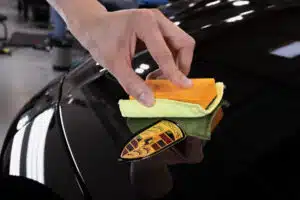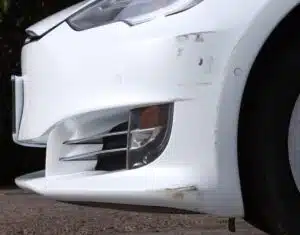The color of a vehicle can affect its resale value by up to thousands of dollars. But what about the condition of the paint? Do rock chips and light scratches affect the resale value? How much of a difference does it make? Read on to find out!
Do Chips and Scratches Really Matter?
A ding or dent may not seem like a big deal to you, but appraisers are picky. If your car has significant chips or pitting, the next owner is going to have to respray it anyway. Appraisers usually grade used vehicles on a four-point scale, with cars graded as either Excellent, Good, Fair, or Poor condition.
More than 80% of vehicles fall into the “Fair” category, while a select few, usually newer used cars that have been driven very lightly and have been garaged for most of their life, are deemed “Excellent.”
Just one or two minor dents, dings, paint scratches, or chips can be the difference between “Fair” or even “Good” or “Poor.’
It’s best to park in a garage out of the elements whenever possible, but if not, dings and dents happen. It’s part of owning a vehicle.
Before trading in your vehicle, have it professionally detailed and take care of all dings and dents, as well as any other exterior deficiencies that can diminish resale value. If you’re serious about maintaining your resale value, investing in paint protection film or at least in ceramic coating is worthwhile to keep the vehicle in factory condition.
How Much of a Difference in Resale Value Does it Make?
This can depend on the vehicle’s paint color, finish, make, and model. According to a study by iSeeCars.com, the average car loses 10% of its value in the first year of ownership. However, cars with poor paint conditions can lose even more value. For example, a car with faded paint can lose up to 20% of its value, and a car with major scratches or dents can lose up to 30% of its value.
Lower miles, frozen paint, and special edition paint jobs on a vehicle would mean a respray probably hurts this sale, as a buyer looking for this car is prioritizing condition. Poorly matched paint and poor application will result in devaluation, no matter what.
What Can You Do to Protect Your Car’s Paint?
Xpel Ultimate Plus Paint Protection Film
[yotuwp type=”videos” id=”5lYXo5w31BU” player=”width=550&autonext=0″]
Paint protection film, also known as PPF or clear bra, is a flexible but durable polyurethane film that is applied to the painted surfaces of the vehicle. We use the Xpel Ultimate Plus line of PPF, which has a 10-year warranty against cracking, peeling, fading, and yellowing. In addition to the long warranty, the PPF also has self-healing properties to remove swirl marks from the film’s surface. Clear bra protects your car from rock chips and other impact-related damage that can occur with everyday driving.
Making it the ultimate way of protecting your vehicle’s paint. If you’re a commuter doing a lot of driving, live in an area where a lot of construction is going on or there is a lot of debris in the roads, you care about not getting rock chips, your vehicle maintaining its look and finish matters, or you want to keep the paint in good condition for when you plan to sell it, then paint protection film is the right option.
There are generally two finish options when it comes to clear bra, satin and gloss. The gloss clear bra will not affect the look of the factory paint. A satin clear bra will turn the color of the vehicle to a satin, or semi-gloss, finish. So if the car is a gloss pearl white, then wrapping it in a satin clear bra will make it satin pearl white.
Pros:
- protects against light scratches and scuffs
- protects against the majority of paint chips from road debris
- can save you from costly paint repairs
- protects against UV damage and oxidation
- protects the surface of the vehicle from chemical etching
- hydrophobic top coat offers easier cleaning
Cons:
- can be an expensive option
- If removed incorrectly, it can peel paint off the vehicle
- Depending on how much of the car is getting PPF, it can require days of installation time
Get a Paint Protection Film Quote
Adams Gold Advanced Graphene Ceramic Coating

The nano-coating forms a semi-permanent bond with the surface of your car, resulting in a “sacrificial” layer over the factory paint. So if the car does need some kind of paint correction, you would be working on the ceramic coating and not your vehicle’s clear coat. Ceramic coating protects from contaminants, as well as providing a deeply shiny and glossy finish to your vehicle by bonding to the clear. These products are called permanent because they can be removed only through polishing or a lack of maintenance.
Pros:
- scratch resistant
- super hydrophobic
- UV protection
- Oxidation and Corrosion resistant
- Chemical resistant
- Super high gloss finish
- No need to wax
Cons:
- application requires 2 days for all installations
- can still pit and etch
- lasts 3-4 years before needing reapplication
Learn more about the Benefits of Ceramic Coat here!

